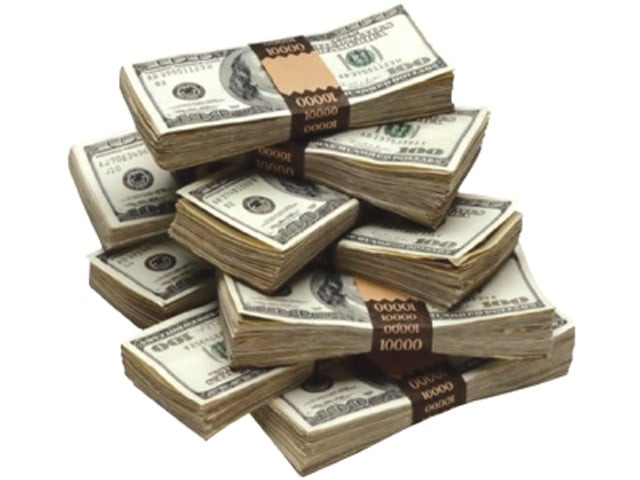Islamabad:
The Central Bank admitted on Tuesday that its almost $ 8 billion of purchases of US dollars maintained the weak local currency, but added that a stronger rupe would make imports cheaper and, in turn, could exert pressure on the external sector.
The interim vice governor of the State Bank of Pakistan (SBP), Dr. Inayat Hussain, told the National Finance Committee of the Assembly Assembly that the current parity of the US dollar of around RS282 was “fair.”
“His statement is correct. If the SBP stops taking dollars from the market, it will strengthen the rupee. But imports will also increase,” he said, answering a question of Mna Muhammad Jawed Hanif.
The Committee, chaired by Syed Naveed Qamar of PPP, received information from the Central Bank on inflation trends, economic growth, current account deficit and exchange rate parity.
During July to May, FY2024-25, the SBP had bought a total of $ 7.8 billion in the local market, said Hussain.
Critics have long accused the Central Bank and the International Monetary Fund (IMF) of manipulating the value of the rupee when buying dollars from the local market in breach of the free market principle that the IMF itself dictates to the world.
Last week, the Vice Prime Minister Ishaq Dar reiterated once again that, based on economic foundations, rupee should trade in RS260. But SBP dollars have kept it closer to RS282 per dollar.
Hussain argued that purchases in dollars have also improved the quality of foreign exchange reserves, which were previously built through foreign loans. Now these reservations are mainly based on local market purchases. “Our main objective is to build reservations. We bought only when there is a ex -surplus foreign currency available in the market,” he said.
MNA Hanif said that the market talk places the fair value of the rupe between RS250 and RS260. By keeping it at RS282, he said, the SBP was contributing to inflation.
“From now on, rupee has a quite price.
The executive director of SBP, Amin Lodhi, said that the objective of the Central Bank was to increase reserves to $ 15.5 billion in December and $ 17.5 billion for June of next year. But this would still be below the safest level of $ 20 billion, equal to three months of import coverage.
Hussain emphasized the need for a stronger mattress to absorb any shock of a reduction in exports given the current challenging environment.
He added that the current account deficit is expected to remain under control and it is expected to be in the range of up to 1% the size of the economy. Foreign remittances remain the main for a lower deficit, and the Central Bank expects remittance tickets to touch $ 40 billion this year.
Inflation perspective
In inflation, Lodhi warned that it can gradually increase and could also temporarily violate the objective of 7% due to the erosion of the base effects and the impact of recent floods. He said the projections show that inflation would then return to the 5-7% range and are expected to remain stable.
He said that the impact of gas prices increases in July and another expected increase in February had already been considered in forecasts by the Central Bank.
However, economic growth can remain limited to around 3.25%, below the objective of 4.2% of the government. The average growth in the last decade has been only 3.4%, which reflects the repeated boom and fall cycles, Lodhi said.
He said that fulfilling the 7% inflation objective would depend on keeping interest rates to the current 11%. If interest rates are reduced, inflation would increase, he said.
The president of the committee said that the SBP was often criticized as “too conservative”, but argued that the economy needed a momentum to grow.
Fiscal controversy
The meeting also resorted to tax matters. The president of the Federal Revenue Board (FBR), Rashid Langial, revealed that Prime Minister Shehbaz Sharif has constituted a committee to review the newly tax for sales of 10% in the fused districts of Khyber-Pakhtunkhwa.
After facing considerable pressure, the Government imposed the sales tax in the budget, but its decision to reopen the matter can raise many eyebrows, particularly in the IMF.
Langial said the committee would be headed by Prime Minister on Political Affairs, Rana Sanoulh Khan.
The newly merged districts were exempt from the sales tax, creating immense problems for other areas of the country due to the 18% cost advantage enjoyed by the industries located there. The installation was very badly used, forcing the Government to withdraw the exemption and impose a 10% tax in the current fiscal year.
Qamar said the Public Accounts Committee had referred the issue to the Permanent Finance Committee after receiving representations of several commercial agencies.
The president of FBR proposed fiscal differential subsidies so that the residents of these districts through the Benazir Income Support Program (BISP) compensated for the impact, but the Committee rejected the recommendation.




